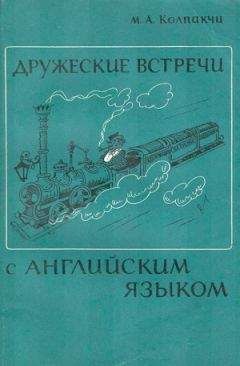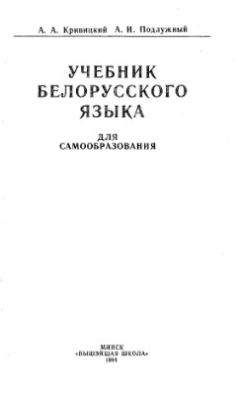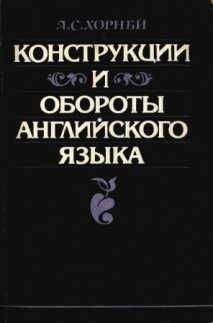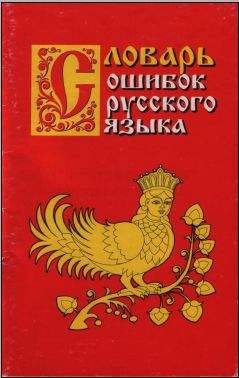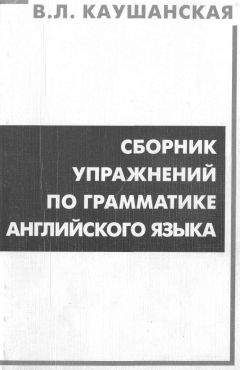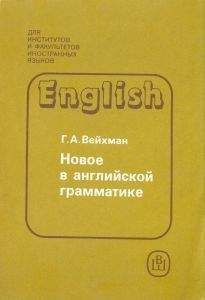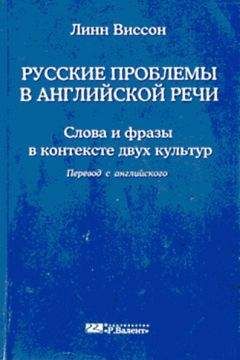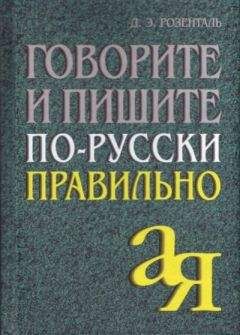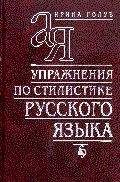Мария Аполлова - Specific English. Грамматические трудности перевода
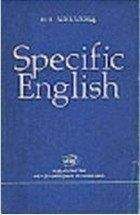
Скачивание начинается... Если скачивание не началось автоматически, пожалуйста нажмите на эту ссылку.
Жалоба
Напишите нам, и мы в срочном порядке примем меры.
Описание книги "Specific English. Грамматические трудности перевода"
Описание и краткое содержание "Specific English. Грамматические трудности перевода" читать бесплатно онлайн.
Пособие знакомит читателя с характерными особенностями английского языка и типичными случаями расхождений с русским языком. В нем суммируются те черты грамматического строя английского языка, которые в силу их специфики представляют трудность для учащихся.
В предлагаемом пособии ставится цель ознакомить учащихся, прошедших первоначальный курс английского языка, с некоторыми характерными системными особенностями этого языка и типичными случаями расхождений с русским языком. Поскольку способ выражения мысли проявляет себя прежде всего в строе языка, в его грамматике, то в пособии вскрываются именно особенности английской грамматики, притом те особенности, которые находили меньшее отражение, а главное — не подвергались достаточной отработке в учебной литературе.
Пособие не претендует на полноту и систематичность описания специфики английской грамматики, но обращает внимание учащихся на отдельные интересные, с точки зрения автора, моменты, которые и придают английской речи ее неповторимое своеобразие.
Кроме того, в пособии рассматриваются такие особенности английского языка, как конверсия, лаконизм английской речи, с одной стороны, и тенденция к известным усложнениям и избыточности — с другой, переходность глаголов и некоторые другие моменты.
Каждый раздел пособия содержит теоретические заметки с иллюстративными примерами в переводе автора. Пособие имеет упражнения, построенные на оригинальном языковом материале и направленные на закрепление практических и переводческих навыков.
Б. 1. Fred Phirmphoot’s job was to calculate how much could be stowed aboard Flight Two and where. 2. No mailbag, no individual piece of freight went into any position in the aircraft hold (багажник) without his say-so. 3. Have you been a stowaway on other airlines? 4. She had always been «in painting», as she put it, and there was no doubt in her mind that it was a come-down to be the mistress of a businessman. 5. Standish had been about to turn away, but something about the man attracted his attention. It was the way the newcomer was holding his case under his arm, protectively. Harry Standish had watched people many times, doing the same thing as they came through Customs. It was a giveaway that whatever was inside the case was something they wanted to conceal. 6. He watched the swim of faces as the train moved. 7. He certainly ought to speak to Randall sometime about the drink. 8. The money was rather a bother. 9. I did not want to expose Elliott to the humiliation of asking her to invite him to her big do. 10. The one hopeful sign was that Senator Michael Mullen confirmed that he was prepared to act as a go-between for the two movements. 11. I couldn’t feel the drag in those eyes. I began to swim dizzily in their depths. 12. He saw the hurt creeping into her eyes, and he reached for her hand. 13. What they have negotiated is a sell-out of the rights of the British people to decide their own destiny. 14. The British government must tell the US that it will not tolerate any repeat in Portugal of the Chile «scenario». 15. They thought him inhuman. It was true that there was nothing come-hither in him. They were talking loudly and laughing, for they had all drunk enough to make them somewhat foolishly hilarious, and they were evidently giving one of their number a send-off. Lord, how I look forward to a dip in the Atlantic. I’d give anything for a good long swim. 18. In a rush I realised the house boat was someone’s hide-out.
В. 1. The crowd was thinning now. 2. Her features had fined down. 3. She always felt secure when Ellen was by her, for there was nothing so bad that Ellen could not better it, simply by being there. 4. It’s a sure thing one of us can’t show up in the cabin, or we’ll alert him. 5. This was Tom Helliwell who now came crunching over the snow to meet him, his silver-gilt hair prettied by the dust of snow. 6. Maybe it was the whisky warming my stomach. 7. What ammunition they had was secreted in their home. 8. But while she was maturing politically, her husband became a reactionary. 9. I’d yearned so much for a ride in Riley’s car that now the opportunity presented itself nothing, even the prospect that no one might see me, could have thinned my excitement. 10. Back of her there appeared to be an entire orphanage emptying out of the truck. 11. But he outsmarted me. 12. Such a splendid friend would not have wronged me. 13. Maude’s cheeks pinked.
Г. 1. They never had become rich. But always, at the Marsh, there was ample. 2. Indeed it was strange to enter up that silent cove, protected by the green hill, in the still cool of the evening, and see there a sailing vessel. 3. The next day I took a local to the place where the mine was. 4. It irked him that even Ann did not treat Nancy Bowshott as an equal. 5. Now she was sitting behind closed doors with him and him alone, as the evening drew on, and hoping like a seventeen-year-old that perhaps he might invite her out to dinner.
II. Определите синтаксическую функцию выделенных наречий в следующих предложениях. Переведите эти предложения на русский язык.
А. 1. Tonight is important to me. 2. «What are you going to do,«he asked, «when you leave here?» 3. «You’re wrong there» I interrupted quickly. 4. In the ordinary way she would have been home at her apartment hours ago. But today had been exceptionally full, with two conventions moving in and a heavy influx of other guests. 5. My clear, surely you know Charleston! You’ve visited there. 6. I think I must find somewhere to sit. 7. Tomorrow’s St Stephen’s Day. 8. You have the effrontery to stand there telling me you’ve sold elsewhere! 9. Tonight was different. 10. I’d like to leave here no later than Thursday night. 11. «Where was his parish?» «Concepcion [12] and the villages around. But he left there years ago.» 12. Ashley was acting as if he thought she was just flirting with him. But he knew differently. 13. You grow up like your father. Try to be just like him, for he was a hero and don’t let anyone tell you differently. 14. That would be all they needed to know until such an evil day when they might find out differently. 15. It’ll be interesting to see what abroad’s really like. 16. He missed the absence of the outback, the absence of a totally untamed beyond. 17. He raised his hands awkwardly and lifted the hair back over her brow, to reveal her bland and smiling beneath. 18. It was as if she were perpetually haunted and mocked by a music of happiness which came from some inaccessible elsewhere. 19. He was as fit as a fiddle when he left here. 20. There is nowhere else for them to work. 21. It was hard to reconcile herself to the fact that she had nowhere to go. 22. Fortunately we had not that far to go.
Б. 1. He was shorter than Leamas remembered him; otherwise, just the same. 2. Anger had always come easily – except for those few brief years when Hester had taught him otherwise: to use patience and a sense of humour. 3. Call me if there’s anything new that’s important. Otherwise I’ll be in touch with you. 4. At eighteen Andrew found himself alone, carrying a scholarship worth 40 pounds a year, but otherwise penniless. 5. Aunt Pitty knew nothing about men, either with their backs up or otherwise, and she could only wave her fat little hands helplessly. 6. She knew perfectly well that airlines never prosecuted stowaways, on the theory that publicity would be more harmful than otherwise. 7. «I’ve no luggage,«Leamas replied, «except a tooth-brush and а тают.» «That is taken care of. Are you ready otherwise?» 8. «What’s his hame?» «Finegan. He’s acting chief (замещает заведующего). Our regular chief is otherwise engaged.» 9. The reason he had stayed, through most of the three-day storm, was to be available for emergencies. Otherwise, by now he would have been home with Cindy and the children. 10. Briefly, the policeman seemed ready to vent his own anger, then decided otherwise. 11. He would have preferred to have the note, but to insist would raise an issue, emphasising the incident, which otherwise might be forgotten. 12. She had been perfectly happy in her way, and it was pure sentimentality to wish that her way had been otherwise. 13. She hoped everything would work out that way because it would be more difficult otherwise.
B. 1. I am so glad to have you with us. 2. You saw most of the places that tourists usually see. So this year you want a rest from sightseeing. 3. All the shops are closed and so are the theatres and most of the cinemas. 4. I may even get to be an airline vice-president. You just said so. 5. «Tell me, is it true? Are the Yankees coming?» «I’m afraid so.» «Do you know so?» «Yes, Ma’m. I know so.» 6. You say you wish to meet and make friends with as many people as possible, so I won’t suggest a quiet fishing village. 7. «Who was it said all men are equal, Anne? Do you remember?» «Has anyone ever said so?» 8. Warren Trent lit a cigar, motioning to McDermott to take a cigarette from a box beside him. When he had done so, Peter said… 9. Until the war, life was never more real to me than a shadow show on a curtain. And I preferred it so. 10. It was a safe bet, Mel thought, that Cindy had been more than usually snippy with Danny, but, loyally, he wasn’t saying so. 11. The planes had been close, exceptionally so, and for an instant his flesh had prickled with alarm. 12. That so many had turned out at all on such a night, leaving warm houses to do so, spoke eloquently of their concern. 13. Her father gave us this house as a wedding present, so we haven’t to pay the rent. 14. «No smoking in here,«the girl said. «Who said so?» said Julian. 15. They were selling papers right in the Bellevue-Stratford. They were so. 16. «He’ll be ruined.» «I don’t think so.» 17. I could see that the big man opposite me was trying to stop him; but he evidently held the old gentleman in considerable respect and could not venture to do so at all abruptly. 18. But she knew too well that it was her nature, she was born so and she must make the best of it.
III. Определите синтаксическую функцию слова down в следующих предложениях и переведите их на русский язык.
1. You aren’t down. Nothing will down you. 2. She’s got a down on him. She crossed his name out on the list herself. 3. Crusty colonels downing their crushed port are foaming at the mouth and knocking at the knees.
IV. Переведите следующие слова и словосочетания на русский язык.
tonight sixish, tennish, eightish, half-past-fivish, mid-nightish
Лаконизм
Для английского языка как языка аналитического характерно стремление к отказу от грамматических «излишеств», к экономии грамматических средств. Так, идея отрицания, как мы уже говорили, выражается в нем только одним отрицанием в предложении; в условных и временных придаточных предложениях, действие которых отнесено к будущему, глагол-сказуемое употребляется в настоящем времени, ибо сам факт употребления глагола-сказуемого главного предложения в будущем времени и самая природа условных и временных придаточных предложений являются уже достаточными показателями будущности; определительные придаточные предложения часто присоединяются к главному бессоюзно, так как опущение союза не ведет к неправильному их пониманию; предикативное сочетание («предикатив + его определение») в именном составном сказуемом в предложениях типа The station is about an hour’s walk или The shoes are the right size обходится без предлога, тогда как на русский язык эти сочетания переводятся косвенным падежом или с помощью предлогов.
Станция находится на расстоянии примерно часа ходьбы. Эти туфли – нужного размера.
(По-видимому, это явление такого же порядка, как и бессоюзное присоединение придаточного определительного к главному предложению: грамматическая неоформленность определения.)
Условные, уступительные и другие придаточные предложения, как правило, бывают эллиптическими, в случае если подлежащее главного и придаточного предложений одно и то же. Например:
Her attitude, whether of suspicion or jollity, seemed always designed to get the last ounce of him. Ее манера держаться с ним, то подозрительная, то шутливая, казалось, имела всегда одну цель: вытянуть из него последний грош.
His tone, though bitter, was serious. Он говорил, хотя и с горечью, но серьезно.
Лаконичными и выразительными являются уступительные придаточные предложения, в которых нет ни союза, ни подлежащего, а есть только значимая часть сказуемого. На русский язык они переводятся, как правило, развернуто.
I should say at once, husband or no husband, it serves him right and teaches him a lesson. И я прямо скажу, хоть он и муж мне, так ему и надо, и пусть это будет ему уроком.
But fire or no fire, her job was to get herself back into the bedroom before she was discovered. Но даже если и пожар, ее задачей было вернуться в спальню, пока ее не обнаружили.
Вышеприведенная модель (husband or no husband) несколько видоизменяется, если существительное в эллиптическом предложении имеет при себе определение.
Peremptory tone or not, Peter thought, it was an attractive voice. Питер решил, что голос был приятный, несмотря на повелительный тон.
Придаточное подлежащее, начинающееся с It was not that… часто сокращается до Not that… и переводится на русский язык Не ’то чтобы…, Нельзя сказать, чтобы…, Вряд ли… Например:
It was not that she was basically unkind. He то чтобы она была от природы недоброй. Not that she knew why she was crying. Вряд ли она знала, отчего плачет.
Многим союзам английского языка соответствуют в русском собственно союз и соотносительное слово, стоящее в главном предложении. Так, where переводится не только где, куда, но и там, где; туда, куда, what – не только что, но и то, что и т. д.
Подписывайтесь на наши страницы в социальных сетях.
Будьте в курсе последних книжных новинок, комментируйте, обсуждайте. Мы ждём Вас!
Похожие книги на "Specific English. Грамматические трудности перевода"
Книги похожие на "Specific English. Грамматические трудности перевода" читать онлайн или скачать бесплатно полные версии.
Мы рекомендуем Вам зарегистрироваться либо войти на сайт под своим именем.
Отзывы о "Мария Аполлова - Specific English. Грамматические трудности перевода"
Отзывы читателей о книге "Specific English. Грамматические трудности перевода", комментарии и мнения людей о произведении.






